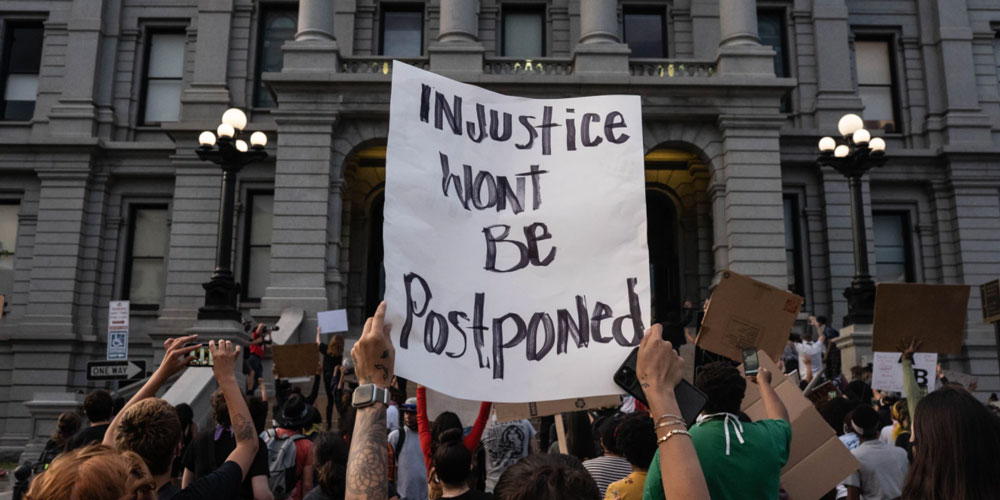Justin Roias — the Providence City Councilor for the ward covering the North End — doesn’t like self-storage facilities. That’s fine, but his response and reasoning raise crucial points of organization and problem solving:
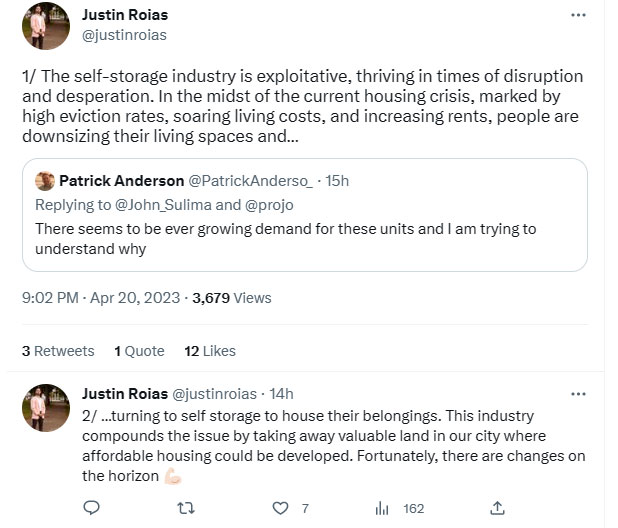
I came across Roias’s tweet via Rachel Miller, who is participating in “the effort to update our zoning laws to prohibit new self storage facilities in Providence.”
Rhode Islanders must come to understand (and soon) that this sort of thinking lunges into a downward spiral. Even if we go along with the premise that “the self-storage industry is exploitative,” such businesses do not create the “times of disruption and desperation” to which they’re responding. We could also say that flies are exploitative of festering wounds, but the appropriate response isn’t to spend time batting away flies; it’s to tend to the wounds.
Personally, I’d go farther and insist that progressive policies are to blame for the disruption and desperation, which is why progressives spend so much time chasing down the symptoms as a means of denying the illness. If I’m too extreme in this, however, bans are still not the best solution. Create opportunity for individuals and for businesses in the city, and self-storage will cease to be the most profitable use of the land. It’s that simple.
If Rhode Island progressives can’t bring themselves to support pro-growth policies, even then they should recognize a fundamental truth: the need for people to downsize and the belongings that they are therefore looking to store do not simply disappear when the city makes their lives more difficult and expensive by banning nearby storage facilities. To the extent it doesn’t result in even-worse outcomes like street dumping, Roias’s apparent approach will make self-storage facilities more valuable and able to be more exploitative.
We must stop accepting governance by those who don’t see people as autonomous beings trying to make rational decisions in the exchange of services, but as exploiters and victims who all just need to be told what to do by enlightened politicians.
Featured image by Joshua Coleman on Unsplash.
[Open full post]It remains to be seen whether progressives have taken their radicalism a bridge too far with the aggressive push on the trans issue. Sentiments like the following tweet from Sam Bell, a far-left Democrat state senator from Providence, probably read like commentary from a bizarro world to most parents (or anybody with a tendency to think things through):
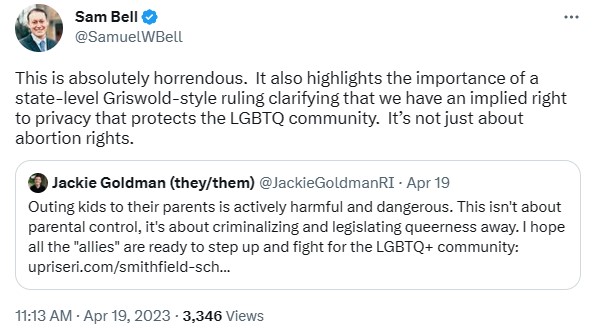
First, let’s get some context. At the end of the thread of links is an article by radical writer Steve Ahlquist (who does not have children of his own, I don’t believe) objecting to a proposal in the Smithfield School Committee that would curtail the district’s policy of lying to parents when their minor children express doubts about their sexual identities. (Even the notion of small children talking about a “sexual identity” will strike many ears as odd.) Ahlquist correctly notes that this adjustment would be contrary to the state Department of Education’s encouragement of schools to have policies of deception. This statewide guidance, alone, ought to be enough to persuade parents of the danger of entrusting their children to government-run schools.
Naturally, when I expressed a contrary opinion, one of Bell’s followers took the accusatory tack of implying that any parents who don’t go along with the radicalism must be suspicious on the grounds that their children find them untrustworthy. Such responses expose two important problems with this entire way of conceptualizing schools and parental rights.
Primarily, it’s simplistic, aggressive, and manipulative. Good parents want to know when important and, especially, unexpected behaviors crop up in their children, and the progressives’ view could apply to anything. If your child is getting bad grades, showing evidence of getting involved with drugs, or anything else that kids tend to hide from their parents, the radicals could just as easily blame the parents for the insinuated lack of trust in that area. Schools are supposed to work collaboratively with parents to catch and correct such developments, and schools are supposed to take a subsidiary place to them. It is parents’ role to determine whether the other adults with whom their children interact are trustworthy, not the other way around.
Even parents who believe their children will trust them with every secret should reevaluate their views if they think schools should have the authority to lie to other parents of whom they don’t approve. The radicals’ policies lump all parents under a cloud of suspicion characterized by the worst parent they can imagine; you’re not exempt from that condemnation just because you think you’re a good person.
A more-practical point too often missed is that it is insufficient simply to assert that some parents might not react the way well-meaning people would prefer when they receive information about their children. We have to evaluate the alternative. In this case, the alternative is moving the school to the primary position of authority, empowered to evaluate the parents. This can’t be done in the abstract, and it can’t posit the ideal schoolteacher and administration as the hypothetical alternative to the worst possible parent.
Indeed, if we promote policies that give school employees a maximal amount of trust — giving them social approval and legal support to lie to parents about matters of sexuality — we’re creating a gigantic magnet for precisely the sort of predators from whom we should protect children. Ideological predators belong on the watchlist in addition to sexual predators.
As with everything involving public schools, take careful note of the lack in accountability. What safeguards are there for these lie-to-parents policies? What consequences are there for teachers, counsellors, and administrators who make calamitous decisions in these sensitive areas? None and none. Intrinsically, parents can have no ability to appeal or seek other opinions when the government agency is actively hiding the truth from them.
We can tell the motivation isn’t ultimately the well-being of children because of the vagueness and carelessness of the plans. If the radicals were serious, they’d propose comprehensive safeguards, with many levels of approval and outside review. They’d include strong consequences for any of the professionals who negligently make mistakes. They don’t even attempt it. The radicals aren’t serious; they’re just radical.
Thus, we can conclude that they don’t care how many children or families they harm. The issue isn’t the issue; the revolution is the issue.
Featured image from Shutterstock.
[Open full post]Observing that a significant majority of Americans now believe the COVID lab-leak theory despite the idea’s having recently been banned on “Big Tech platforms,” Glenn Greenwald recalls a 2021 Pew Research finding that over a mere three-year span the percentage of Democrats who support big-tech censorship had grown from 60% to 76%, and (worse, in my book) their support for government censorship had increased from 40% to 65%.
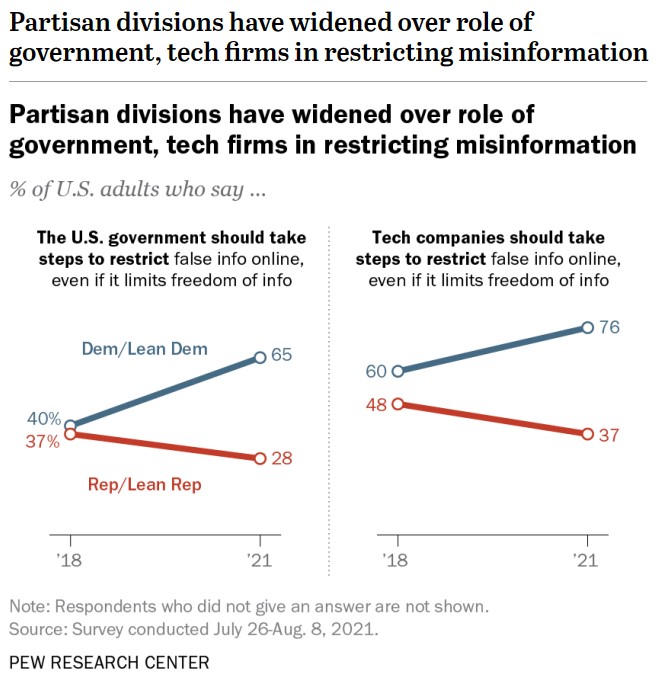
This relates to a p0int I’ve been making frequently over the past few years, particularly with reference to local news media: Journalists and others have given themselves permission to deliberately ignore views that conflict with their own, which generally means those that conflict with radical progressivism.
To see my impression reflected in the data, scroll down to Pew’s table of results for different demographic groups. Arguably the most shocking trend in the data is the increase of support for censorship among those with at least a college degree. They went from the least likely to support censorship to the most. When it comes to big-tech censorship, this group went from 53% support for censorship to 61%, 2018 to 2021. And terrifyingly, support for government censorship among the college educated jumped from 30% to 51%.
This trend, if it isn’t a quirk of the unusual COVID-Trump period, is a massive red flag warning of the end of our civilization. Not only does it indicate systemic indoctrination of American youth, but the particular form of that indoctrination is particularly toxic. The people who should be the most comfortable analyzing information believe one of two propositions, or both: Either they, for all their education, do not think they can determine when they can trust the information they find, but that experts in the government can do that work for them, or they do not trust their fellow Americans to make up their own minds and feel it is government’s role to manipulate them.
Well-meaningly, of course.
Featured image from Shutterstock.
[Open full post]On WNRI 1380 AM/95.1 FM, John DePetro and Justin Katz discuss:
- An education plan that fails to go beyond the slogan.
- How under-delivering is on brand for the governor.
- How not to react when the media is on your cul-de-sac.
- The campus revolution infiltrates Bud Light.
- Magaziner’s inability to read graphs.
- McKee drawn by the smoke and fire.
Featured image from Shutterstock.
[Open full post]Guest: Mike Stenhouse, CEO, RI Center for Freedom and Prosperity www.rifreedom.org
Host: Richard August
Description: Guest Stenhouse discusses RIDE curriculum mandates for social studies and history. His organization RI Center for Freedom and Prosperity sponsored a review of the curriculum. It concluded that Rhode Island’s incomplete social studies standards shortchange students by teaching radical activism instead of America’s birthright of liberty. Furthermore, history studies are missing important facts and are more a method for ideological indoctrination. Stenhouse invites viewers to visit www.rifreedom.org/action-center for more information.
If you pay attention to non-leftwing media and/or haven’t blocked or muted anybody who isn’t progressive on social media, you’re likely to have heard that Anheuser-Busch has taken a huge financial hit after a young marketing executive aligned the company fully with radical gender ideologues by partnering with transgender influencer Dylan Mulvaney, a man whose presentation as a woman comes off as mockery.
As a cultural flashpoint, the controversy has a multitude of angles to unpack, but Not the Bee points to a key one with much broader implications:
Boycotts of woke products have not largely worked because the media stonewalls coverage of both the controversy and the backlash, keeping the majority of the population in the dark.
A small boycott of conservative companies (or states, for that matter) can have outsized effects because the media Borg floods the news cycle to make it seem like the most important news of the day. Corporate executives react accordingly. Boycotts or protests that go in the opposite ideological direction must be overwhelming to crack that forcefield, and even then, mainstream journalists typically spin the news to make it as favorable to progressives and Democrats as possible. (As the cliché goes, when a Republican or conservative does something objectionable, that’s the story; when a Democrat or progressive does something objectionable, the reaction of Republicans or conservatives is the story.)
For illustration, look at a handful of local media outlets from which Rhode Islanders get their news. Search the Providence Journal for “Bud Light,” and nothing comes up relevant to the story, at least on the first page of results. The same is true of the Boston Globe, even though one of the prominent venues featured in stories about the controversy is in the Boston area. A WPRI search does have one hit, but the focus is spin to make it about Kid Rock shooting Bud Light cans in response. Only WJAR, which serves a generally older audience, is keeping its readers informed about the matter.
None of the above should surprise anybody; what’s noteworthy is how conspicuous this particular story makes the cause, effect, and coverage. The same principles apply throughout our culture.
Progressives change the “marketing” (or meaningful significance) of something in the culture, and people respond. Then, progressive cultural institutions hide or muddle the effects. Without major changes in our news and information ecosystem, we will never, for instance, see any studies or stories indicating that redefining procreation out of marriage might have had harmful effects. Similarly, evidence that climate change concerns were misplaced will be written off without consideration.
A few recent posts in this space are illustrations, as well: Gun deaths spike in the last few years, and nobody in the mainstream notices that Democrat Congressman Seth Magaziner is actually spinning the analysis to seem like a generic gun problem rather than anything that actually happened in the last few years. Similarly, a look at child mortality rates misses the question of abortion and its effect on behavior.
Pick a culture-war issue, and you’ll find similar dynamics. In Rhode Island, in particular, stories that might point back to damage done by progressives and labor unions carefully avoid implicating them. Consequently, as people go about their lives, those who offer warnings are easily dismissed as extremists and lunatics, which allows the revolution to continue to roll… at least until it ends in (probably bloody) catastrophe.
Featured image by Engin Akyurt on Unsplash.
[Open full post]As I’ve said, it’s possible to make too much of such incidents (and politics often seems designed to make too much of them), but they’re worth noting as they happen, nonetheless:
In a letter to FBI Director Christopher Wray, [Republican Congressman from Ohio Jim] Jordan alleged the FBI “relied on at least one undercover agent to produce its analysis, and that the FBI proposed that its agents engage in outreach to Catholic parishes to develop sources among the clergy and Church leadership to inform on Americans practicing their faith.” Jordan further alleged the FBI suggested that “certain kinds of Catholic Americans may be domestic terrorists.” …
In March 8 in testimony before the Senate Select Committee on Intelligence, Wray said when he learned of the memo, he was “aghast.”
Withdrawing a memo after it is released is an easy way to CYA. The question is how many similar memos are out there unwithdrawn that have simply not been leaked, yet.
The greater concern is that all of these supposed problems go in the same direction, like the incident with the Franciscan Catholics and Walter Reed National Military Medical Center, to which I recently linked. If these “errors” were ideologically distributed, we could believe they aren’t systemic and targeted. Instead, it does seem there’s at a minimum an unstated, ideological, and partisan culture in the bureaucracy.
[Open full post]Whether it’s peculiar or not (given his governance style) the most-conspicuous thing about the Learn 365 RI initiative — for which Democrat Governor Dan McKee has sought (and received) a PR boost — is how undefined it is. There’s some effort to get municipalities to commit to something, although what that may be isn’t clear. The governor is promoting a modest $47 million to ” help cities and towns build out community centers to support out of school learning activity,” but the strings and activities are not defined.
And there’s some sort of new non-profit on the scene, but it’s even more shadowy than the other vagaries:
The state will offer guidance to participating municipalities with the help of a newly created nonprofit called Always Learning. McKee was tight-lipped on what exactly the organization will do. However, he said “my interpretation is that they’re going to be able to access philanthropy and other dollars and then they become a facilitator and can provide guidance through staff to help municipalities maximize the learning opportunity.”
In short, there’s no plan, here. The initiative is a general idea and statement of aspiration.
Rhode Islanders should also worry it’s actually not as benign as that suggests. McKee owes the teachers unions, the construction unions, and other state insiders big for his election. Building community centers and pulling together government funding to provide babysitting and other services all year long could help to pay off some of his political debt.
At best, then, Learn 365 RI may be one of those PR stunts that flashes in a news cycle or two and then peters out after the spending of some millions of dollars for the benefit of special interests. At its worst, it could be part of the relentless push by ideologues to gain uninterrupted access to children while creating jobs for themselves.
In that case, the best response would not be mere apathy, but an active effort to Turn 180.
Featured image by Caleb Woods on Unsplash.
[Open full post]As we’re rightly reminded frequently in the face of such incidents, we would err if we overgeneralized from incidents like this one:
A homeless woman “was wiping blood off of her hands with a paper towel” after she allegedly killed a homeless shelter coordinator with an ax, police said.
Zaaina Asra Zakirrah Mahvish-Jammeh, a 38-year-old resident of Morningside House shelter in Brattleboro, Vermont, wanted to talk to Leah Rosin-Pritchard, a 36-year-old social worker, in the living room, according to a probable cause affidavit. …
After attacking Rosin-Pritchard, Mahvish-Jammeh then turned to another employee and said, “I like you. It’s Leah I (sounds like didn’t like or don’t like). I like you,” the affidavit alleges.
On the other hand, we would err if we didn’t realize that historical narratives can become established because they may have truth. Sometimes people are in circumstances like homelessness because they have mental problems. Axes and knives will do in lieu of guns for the purpose of killing.
[Open full post]To solve problems without causing unexpected damage, you have to have some reasonable explanation for the circumstances. This recent anti-gun tweet from Democrat Congressman Seth Magaziner illustrates how politicians are moving farther and farther away from problem-solving:
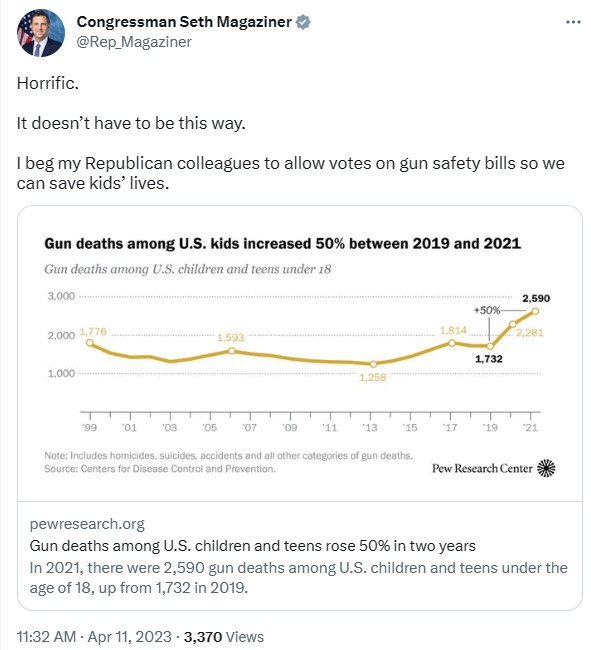
If you’re accustomed to analyzing data visualizations, it might take you a moment to understand Magaziner’s point. The most conspicuous observation from this time-series data is that gun deaths among kids remained largely flat for twenty years — even after the 1994 “assault weapon” ban lapsed in 2004. So, what is Magaziner claiming happened in 2019 to cause a problem that more “gun safety bills” will solve?
The answer is probably “nothing.” He’s just picking a discouraging datapoint (the 50% increase in gun deaths over the two latest years), assuming his audience will agree that gun availability is the problem, and demanding a policy that has long been part of his political party’s platform, regardless of the data.
But if something else is causing the increase, cracking down on constitutional gun-ownership rights probably won’t reverse it. Meanwhile, unknowable consequences ranging from increases in crime to erosion of civil rights to worse political division may emerge.
One suspects Democrats like Magaziner don’t actually want to explore the causes of such problems because they may whipsaw against their own political interests. Ideological takeover of our education system, soft-on-crime and anti-cop policies and district attorneys, and radical deconstruction of social norms may be destroying the mental health of upcoming American generations, and discovering such a thing would undermine the careful work of their party.
On the other hand, it serves Magaziner’s party very well if its policies cause social instability that results in ongoing fear, tragedy, and division that Democrats are then able to exploit to crack down on civil rights and cause more instability.
Featured image by Taylor Turtle on Unsplash.
[Open full post]









